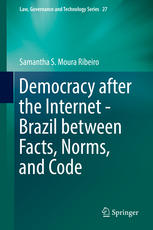

Most ebook files are in PDF format, so you can easily read them using various software such as Foxit Reader or directly on the Google Chrome browser.
Some ebook files are released by publishers in other formats such as .awz, .mobi, .epub, .fb2, etc. You may need to install specific software to read these formats on mobile/PC, such as Calibre.
Please read the tutorial at this link: https://ebookbell.com/faq
We offer FREE conversion to the popular formats you request; however, this may take some time. Therefore, right after payment, please email us, and we will try to provide the service as quickly as possible.
For some exceptional file formats or broken links (if any), please refrain from opening any disputes. Instead, email us first, and we will try to assist within a maximum of 6 hours.
EbookBell Team

0.0
0 reviewsThis book throws new light on the way in which the Internet impacts on democracy. Based on Jürgen Habermas’ discourse-theoretical reconstruction of democracy, it examines one of the world’s largest, most diverse but also most unequal democracies, Brazil, in terms of the broad social and legal effects the internet has had. Focusing on the Brazilian constitutional evolution, the book examines how the Internet might impact on the legitimacy of a democratic order and if, and how, it might yield opportunities for democratic empowerment. The book also assesses the ways in which law, as an institution and a system, reacts to the changes and challenges brought about by the Internet: the ways in which law may retain its strength as an integrative force, avoiding a ‘virtual’ legitimacy crisis.